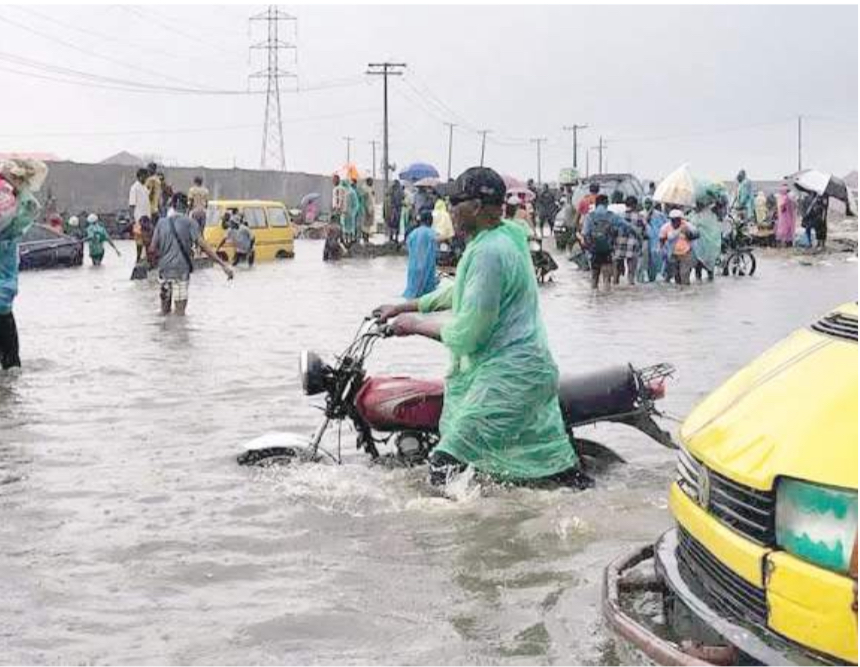It may seem insignificant to some people, but most times we don’t notice that weather patterns are drastically changing. We complain of heat while the season lasts. Once the heat season is over, we forget. Then comes the rainy season which will also take a different turn due to climate change.
Though we notice these extreme weather conditions for a short while, the truth is that changing weather patterns have adverse effects on the planet. And if nothing is done to correct or halt certain hazardous human practices, unfriendly weather patterns will get worse as the years go by.
At the Seasonal Climate Prediction (SCP) issued on February 4, the Minister of Aviation and Aerospace Development, Festus Keyamo, lamented that as climate change continues to reshape our planet, the aviation industry faces increasing challenges—from erratic weather patterns to the growing frequency of extreme events which directly impact airline operations.
According to the minister, “Adverse weather – thunderstorms, squalls, wind shear, heavy rainfall, flash floods, sandstorms, dust haze, fog, and so on, are some of the greatest challenges in aviation, resulting in flight delays, injuries, economic losses including loss of lives and property.
“Aviation is a weather sensitive sector – decisions on flight plans, take-off and landing are not made without first considering the weather conditions.”
He said, “The International Air Transport Association (IATA) reported that global flight delays due to weather conditions have been on the increase, jumping from 11 percent in 2012 to 30 percent of total flight delays in 2023.
“According to ICAO, while turbulence have long been a leading cause of injuries in-flight, scientific evidence suggests that there may be more severe weather patterns brought about by climate change which could lead to more turbulence-related accidents.”
The World Meteorological Organisation (WMO) stated recently that Nigeria has witnessed increasing heat waves continuously for over a decade.
Yet the Seasonal Climate Prediction for 2025 revealed that this year will be warmer than the previous years up to last year.
The Northwestern Regional Representative of the WMO, Bernard Gomez noted: “Today, humanity is faced with the challenges of climate change.The world witnessed the hottest 10 years on record in 2024.
“The year 2024 was also confirmed as the hottest year on record and is likely to be the first calendar year to temporarily hit 1.5 °C above the pre-industrial era.
“Every fraction of a degree matters to our lives, our livelihoods and biodiversity as this increases our vulnerability and exposure to more frequent and intense heat waves, more devastating storms, floods and drought, and more rapidly intensifying tropical cyclones.
“In Nigeria, the frequency and intensity of heat waves, windstorms, floods, and dry spells has witnessed an increase in the last 10 years with huge implications for human lives and socio-economic development.”
Similarly, the Director General of Nigerian Meteorological Agency (NiMet), Prof. Charles Anosike, also noted that unprecedented weather extremes in the past few years are on the rise.
He said early warning gaps such as inadequate finance and access to latest technologies, uncoordinated dissemination efforts, insecurity and maintainability of early warning systems must be proactively addressed.
“We must recognise that closing the early warning gap requires all – including strong collaboration, coordination and cooperation between national and international partners, policymakers, the private sector, and local communities, especially the youth. Government alone cannot do it.
“Just like the WMO noted, early warning systems protect everyone, everywhere on the planet. To achieve this, international collaboration is more important than ever before.
“National ownership remains at the heart of the Early Warnings for All initiative, with governments leading efforts to strengthen resilience and establish sustainable early warning systems.
“National Meteorological and Hydrological Services must remain the source of authoritative warnings, while the private sector can help drive innovation, strengthen dissemination, and enhance risk knowledge.
“We are glad to note that collaboration with bilateral and multilateral donors, climate funds, and development banks is increasing support for early warning efforts. This is because the Early Warnings for All initiative is a human and moral imperative and it makes economic sense.
“On a global scale, every US$1 invested in early warnings is estimated to result in about US$9 in net economic benefits. This analysis is higher at the national level.”
Weeks ago, Keyamo highlighted the increasing negative impact of weather and climate on the aviation industry.
He said, “Early warning systems, backed by robust climate predictions, are essential to overcoming these challenges and ensuring safety, efficiency and sustainability of air navigation business.
“NiMet’s SCP plays a pivotal role in this regard. It empowers stakeholders with the knowledge to anticipate and adapt to climatic changes, ensuring that aviation operations remain uninterrupted and that lives, and property are safeguarded.
“The SCP document we are unveiling today is a critical tool for informed decision-making. It offers insights into expected weather and climate patterns, equipping various sectors with the foresight needed to plan, mitigate risks, and harness opportunities. Agriculture, disaster risk management, health, marine operations, transport—and especially aviation—are among the many domains that will benefit from this invaluable resource and advisory.”
He explained that timely climate predictions will enable farmers to optimise farming schedules thereby improving the nation’s food system security; disaster managers to prepare for emergencies and minimise risks; and health authorities to anticipate disease outbreaks linked to weather and climate variations. These underscore the interconnectedness of weather, climate, and socio-economic resilience.
“Over recent years, we have continued to observe unprecedented weather patterns that have tested our preparedness and resilience. From consistent warmer-than-normal temperatures to flash floods, the extremes of our climate are increasingly evident.
“These events serve as reminders that we must remain vigilant and proactive. We must continue to invest in sustainable practices, strengthen our infrastructure, and support communities that are most vulnerable to climate change impacts. Our seasonal climate predictions are not just about forecasting, they are about shaping our response to the challenges ahead,” Keyamo stated.
The minister reiterated that the challenges posed by climate change demand innovative solutions, and the Ministry of Aviation and Aerospace Development, through NiMet, will remain at the forefront of these efforts.
Read Also: Court permits EFCC to arrest, detain six alleged CBEX promoters
“With the support of policymakers and industry leaders, we can build a more resilient and prosperous Nigeria,” he concluded.
As experts across different sectors call for solutions to mitigate rising harsh weather conditions including planting of trees, transiting from oil and gas to renewable energy and decarbonisation of ships to reduce emission, it is important the Nigerians pay attention to climate change in order curtail the effects of extreme weather patterns.








